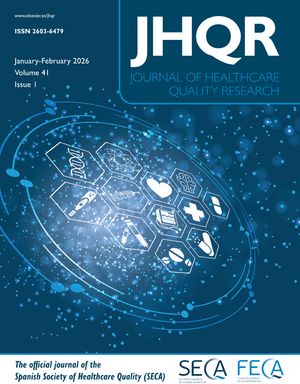Valorar el impacto de la hospitalización a domicilio en el seguimiento postoperatorio de la cirugía benigna tiroidea, comparándolo con la hospitalización convencional, en cuanto a la estancia hospitalaria y a la existencia de complicaciones.
Material y métodosSe realiza un estudio comparativo entre dos series homogéneas de pacientes operados de enfermedad benigna de tiroides entre 1993 y 1999 en el Servicio de Cirugía General del Hospital Universitario Arnau de Vilanova. Las series se diferenciaban sólo en función del lugar donde se había realizado el postoperatorio: totalmente en el hospital (hospitalización convencional) o parte en el hospital y parte en el domicilio, a cargo de una unidad de hospitalización a domicilio. La inclusión en el grupo de hospitalización a domicilio dependía solamente de dos factores: residir en la zona de cobertura de la unidad y que el paciente y la familia estuviesen de acuerdo.
Se recogieron los siguientes datos: lugar de residencia, edad, sexo, tipo de intervención, días de estancia hospitalaria, días de seguimiento domiciliario y complicaciones que fueron analizados estadísticamente mediante el programa informático SPSS 9.0
ResultadosEntre los resultados destaca la elevada frecuencia de mujeres en la serie (90%), la diferencia en la estancia hospitalaria entre las dos series, siendo de 5,81 días en el caso de hospitalización convencional y de 2,78 días en el caso de hospitalización a domicilio, aunque en este caso se le habrán de añadir los 2,18 días de control en su domicilio. Por último el porcentaje de complicaciones menores (38%), similar en las dos series.
ConclusionesLa hospitalización a domicilio reduce los días de hospitalización convencional en este tipo de cirugía, ya que incluso si aparecen complicaciones no se alarga la estancia hospitalaria, porque son controladas en el domicilio. Además parece que la hospitalización a domicilio es tan segura como la convencional en la cirugía benigna de tiroides. Por último, se podría considerar una buena opción terapéutica la combinación de cirugía de corta estancia y hospitalización a domicilio en pacientes previamente seleccionados.
The objective of this study was to evaluate the impact of hospital at home care on hospital stay and perioperative complications in the postoperative period following surgery for benign thyroid disease compared with inpatient hospitalization.
Material and methodsThe authors present a comparative study between two homogeneous series of patients who underwent surgery for benign thyroid disease between 1993 and 1999 in the General Surgery Department of the Arnau de Vilanova University Hospital in Lleida (Spain). The two series differed only in the site of the postoperative stay: one series remained in hospital throughout the postoperative period (inpatient hospitalization) and the other spent the last part of the postoperative period at home (under the care of the hospital’s Hospital at Home Unit). Inclusion in the hospital at home group depended on only two criteria: residence in the unit’s catchment area and willingness on the part of the patients and their families. The following data were collected: place of residence, age, sex, type of operation, days of hospital stay, days of follow-up at home and complications. These items were statistically processed by SPSS 9.0 software.
ResultsThe most important results were the large percentage of women in the study (90%) and the difference in hospital stay between the two series (5.81 days in inpatient hospitalization and 2.78 days in hospital at home care). However, in the latter case, 2.18 days of hospital at home follow-up should be added. The number of minor complications was the same in both series (38%)
ConclusionHospital at home care reduces the length of inpatient hospital stay in surgery for benign thyroid disease since, even if complications occur, they do not increase hospital stay because they can be treated at home. Moreover, hospital at home care seems to be as safe as inpatient hospitalization. Finally, in selected patients, the combination of short-stay inpatient hospitalization and care at home could be a good therapeutic option in this type of surgery.






